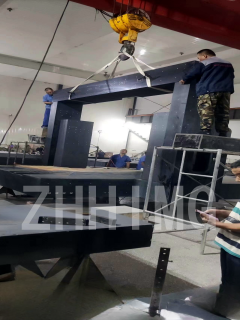The maintenance and maintenance of precision platforms are of vital significance for their long-term use and stable performance. First of all, regular maintenance can ensure that the platform components are in good working condition, timely detection and resolution of potential problems, so as to prevent small problems from evolving into major failures, extending the service life of the platform. At the same time, the maintenance work can also maintain the accuracy and stability of the platform, reduce the performance fluctuations caused by external factors such as vibration and temperature changes, and ensure the stable and reliable performance of the platform in long-term use. In addition, maintenance and maintenance can improve the safety and reliability of the operation, reduce the risk of platform failure during operation, and ensure the continuity and stability of the production process. From an economic point of view, reasonable maintenance and maintenance strategies can reduce the whole life cycle cost of the platform, which is a very forward-looking and economic decision.
At the same time, for precision platforms of different materials and specifications, the reasons for the price difference are mainly reflected in the following aspects:
1. Material difference: The core components of the precision platform, such as guide rail, transmission mechanism, support structure, etc., the material used will directly affect its cost. High-end materials such as stainless steel, aluminum alloy or special alloys not only have higher strength and corrosion resistance, but also provide better accuracy and stability, so the price is relatively high. The platform with ordinary materials, although it can meet basic needs, may be lacking in performance and life, and the price will naturally be lower.
2. Specifications and size: The specifications and size of the precision platform are also important factors in determining the price. Large, heavy-duty or high-precision platforms require more materials and more complex manufacturing processes, so they cost more and sell for more. On the contrary, small, light load or standard precision platforms are lower cost and more affordable.
3. Function and performance: Different precision platforms may have significant differences in function and performance. Some high-end platforms may integrate multiple sensors, control systems, and automatic calibration functions to enable more complex operations and higher accuracy requirements, and these additional features will undoubtedly increase the cost of the platform. The base model platform may only have basic measurement or positioning functions, and the price is relatively simple.
4. Brand and process: Well-known brands usually have more advanced manufacturing processes and stricter quality control systems, which can produce precision platforms with more stable performance and more reliable quality. These brand premiums also contribute to the price difference. In addition, some brands may also provide perfect after-sales service and technical support, further enhancing the added value of the product.
In summary, there are many reasons for the difference in price of precision platforms of different materials and specifications, including material cost, specification size, function and performance, as well as brand and process factors. When choosing a platform, users should make comprehensive consideration according to their own needs and budget.
Post time: Aug-05-2024

